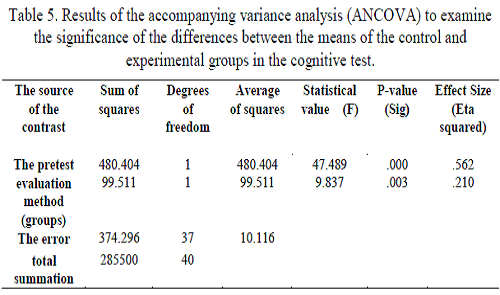
The Effect of Using The Alternative Evaluation on Improving The Educational Outcomes of University Courses on Students (The Scientific Research Methodology Course as a Model)
Abstract
Keywords
Full Text:
PDFReferences
Abdel-Hamid, Jaber (2013). System of comprehensive educational evaluation for the stage of basic education. Ministry of Education, Amman, Jordan.
Afaneh, Muhammad Atiyah Ahmad (2011). The reality of Arabic language teachers' uses of assessment methods in the preparatory stage in UNRWA schools in the Gaza Strip in light of recent trends. Master Thesis, College of Education, Islamic University, Gaza, Palestine.
Allam, Saladin (2004). Alternative educational evaluation. Cairo:Educational Thought House.
Al-Zoubi, Aamal (2013). Degree of Mathematics Teachers' Knowledge and Practice of Realistic Evaluation Strategies and Tools, the Educational and Psychological Islamic University Journal, 21 (3): 165-197.
Assaf, Muhammad (2017). Predictive ability of the cumulative average in the level of job performance of Al-Istiqlal University graduates in Palestine, Master Thesis, Yarmouk University.
Boud, D, (2000) .Sustainable assessment: Rethinking assessment for the learning society, Studies in Continuing education, 22 (2): 151-167.
Diab, Suhail (2011). The Effect of Using Various Evaluation Tools on Students' Basic Achievement in Science and Their Attitudes Toward It, Al-Najah University Journal for Research, Nablus, 26 (3).
Espinoza, O., González, L., McGinn, N., & Castillo, D. (2020). Alternative education programs for high school age students in Chile. Education and Urban Society, 52(4), 561-589.
Fook, C & Sidhu, G. (2010). Athentic assessment and pedagogical strategies in higher education, Journal of Social Sciences, 6 (2): 153-161.
Hunter, R. A., Pompano, R. R., & Tuchler, M. F. (2022). Alternative Assessment of Active Learning. In Active Learning in the Analytical Chemistry Curriculum (pp. 269-295). American Chemical Society.
Liu, Q. H., Zhang, J., Peng, C., Litvinova, M., Huang, S., Poletti, P.,... & Ajelli, M. (2022). Model-based evaluation of alternative reactive class closure strategies against COVID-19.Nature communications, 13(1), 1-10.
Marzano, R.J. (2002). A comparison of selected methods of scoring classroom assessments. Applied Measurement in Education, 15, 249-267.
Napoli, A. R. & Raymond, L. A. (2004). How reliable are our assessment data? Comparison of the reliability of data produced in graded and un-graded conditions. Research in Higher Education, 45(8): 921-929.
Kayal, Nadia (2011). Opinions of graduate students regarding evaluation methods used by faculty members at Birzeit University. Master Thesis, Birzeit University, Palestine.
Kyper, S. M. (2020). A Multi-Site Case Study: Alternative Educational Programming for High School Students in Central Pennsylvania. Drexel University.
Majeed, Sawsan Shaker (2011). Contemporary developments in the educational calendar. Safaa House for Publishing and Distribution, Amman.
Odeh, Ahmed (2010). Measurement and evaluation in the educational process. 4th floor, Irbid: House of Hope.
Suskie, L. (2004). Assessing Student Learning: A Common-Sense Guide.
Tomlinson, C. A. (2001). How to differentiate instruction in mixedability classrooms (2nd Ed.). Alexandria, VA: Association for Supervision and Curriculum Development.
Ventouris, A., Rousoulioti, T., & Iliopoulou, K. (2022). Alternative Evaluation as a Means of Inclusion: The Case of the Public Greek Educational System. In Handbook of Research on Policies and Practices for Assessing Inclusive Teaching and Learning (pp. 333-359). IGI Global.
Wikstrom, N. (2007). Alternative Assessment in Primary years of International Baccalaureate Education, The Stockholm Institute of Education, Thesis 15 ECTS.
Zaitoun, Hassan and Zeitoun, Kamal (2003). Learning and teaching from a constructivist theory perspective. Cairo: The World of Books.
DOI: http://dx.doi.org/10.31258/jes.6.2.p.248-262
Refbacks
- There are currently no refbacks.
Copyright (c) 2022 Mohammed Mohyaldeen Assaf

This work is licensed under a Creative Commons Attribution 4.0 International License.
Publisher: FKIP Universitas Riau












